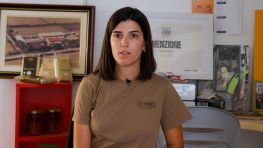 Rosalia Vacca and the Dream of…
Rosalia Vacca and the Dream of… Giuseppe Vacca: A Life Between Rice Fields, Challenges, and the Maestrale Wind
From contract work to family farming: the resilience of a Sardinian rice grower
With over fifty years of experience in the fields, Giuseppe Vacca retraces the journey of his family farm, from the early days of contract harvesting to the 300 hectares cultivated today.
His account highlights the daily struggles: water management, increasingly resistant weeds, rising transport costs, and the shortage of farm labor. Yet there is also the strength of the maestrale wind, which with its salty touch enhances the rice, and the drive to innovate through integrated cultivation methods.
Among flamingos, coypus, and wild boars that populate the rice fields, Giuseppe’s voice captures the timeless essence of a job that reinvents itself daily, balancing hardships and rewards.
Video table of contents
- The characteristics of our lands
- From contractor to farmer and rice grower
- From whom we learned to grow rice
- There are many weeds, the main one being the javone.
- The mistral helps us and enhances the final product
- The new dam on the Tirso and the supply of water for irrigation
- The Land Reclamation Consortium and its management
- Our food rice production
- Food culture in Sardinia and its relationship with rice
- Our rice sold directly
- The difficulty of obtaining seeds
- Our rice varieties
- Adherence to the integrated cultivation method
- The animals that live among our rice fields: flamingos, wild boars, sparrows...
- Transportation is a significant cost: the difficulties of working on an island
Interview information
City: Oristano
Giuseppe Vacca
Year: 1967
City: Oristano
Profession: Farmer
Languages: italiano
Document by: Luca Ghiardo
Video by: Luca Ghiardo
Created: 29-08-2025
Questo video fa parte del seguente archivio
Rice stories
Rice stories
Food is a fundamental resource for man and his health, both through the supply of nutrients and the ability to embody traits of human culture that play a leading role in our well-being.
Over time, each territory has built original ways in which to relate to the fruits of its land, enriching them with rituals, symbolic meanings and culinary customs. Much of these relationships have been lost following the years of the economic boom, with the exodus from the countryside to urban centers, with the advent of agriculture for mass production and ultimately with the globalization of markets and the consequent impoverishment of the heritage of biodiversity and ethnodiversity.
The purpose of this archive is to collect evidence relating to the main rice production area in Europe, that is the Po Valley, and to investigate, through the analysis of textual sources and testimonies collected in the field, both what survives of this heritage, and the ways in which which has evolved and reached us, paying particular attention to the explicit and implicit links that bind food and health.






